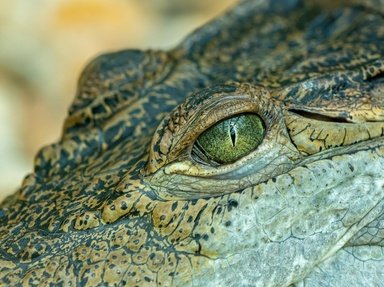Quiz Answer Key and Fun Facts
1. Crocodiles care for their young.
2. Found in Australia, freshwater crocodiles lay their eggs in August. In which month do the eggs begin to hatch?
3. About how big is a newly-hatched American crocodile?
4. From what materials do crocodiles usually build their nests?
5. What would a baby freshwater crocodile eat?
6. Female Nile crocodiles like to nest close together.
7. The gender of a crocodile hatchling is determined by genetics.
8. How many eggs does a female American crocodile usually lay?
9. At what length does a male Nile crocodile reach sexual maturity?
10. When looking at adult saltwater crocodiles, what's the easiest way to tell the difference between males and females?
Source: Author
ElusiveDream
This quiz was reviewed by FunTrivia editor
guitargoddess before going online.
Any errors found in FunTrivia content are routinely corrected through our feedback system.

